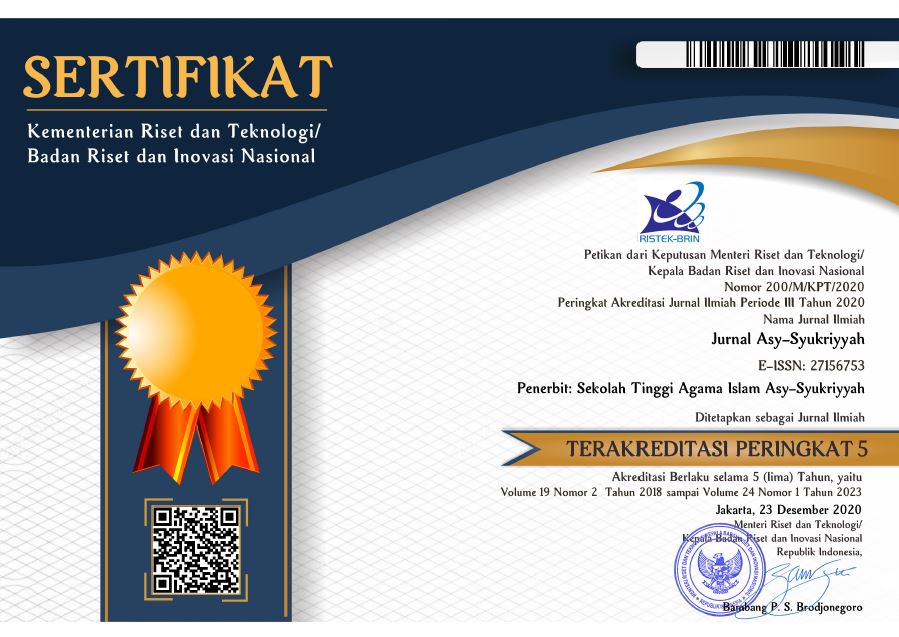KONDISI SOSIAL-POLITIK DINASTI BANI ABBASIYAH DAN PENGARUHNYA TERHADAP PENDIDIKAN ISLAM
DOI:
https://doi.org/10.36769/asy.v24i1.318الكلمات المفتاحية:
Relasi Kuasa، Pendidikan Islam، Dinasti Abbasiyahالملخص
The Abbasid dynasty had given a very high contribution to Islamic civilization in the history of Islam which was marked by the development of Islamic educational institutions and science. This development cannot be separated from the socio-political conditions that occurred at that time. Some of the factors that determine the development of Islamic education and science are the geographical conditions of the Abbasid dynasty located in Baghdad, far from Mecca and Medina which led to the emergence of ijtihad-ijtihad by ulama’ Ahl-Ra'yi; pluralism of people characterized by the presence of non-Arab or militant groups who are very militant; and the ideological feud of kalam, fiqh, and Sufism. In this case, there is a power relationship between government and science. The role of government is very important in determining the direction and form of Islamic education. A very rational style of religious understanding helped shape the development of Islamic education and science. This can be seen from the adoption of the mu'tazilah ideology as the official state ideology in Islamic theology, and the predominance of the ulama 'ahl-Ra'yi in fiqh.
المراجع
Algeriani, Adel M. AbdulAziz, dan Mawloud Mohadi. “The House of Wisdom (Bayt al-Hikmah), an Educational Institution during the Time of the Abbasid Dynasty. A Historical Perspective.” Pertanika Journal 27, no. 2 (2019).
Ansary, Tamim. Destiny Disrupted: A History of the World Through Islamic Eyes. New York: Public Affairs, 2009.
Faisol, M. “Struktur Nalar Arab-Islam Menurut Abid al-Jabiri.” TSAQAFAH 6, no. 2 (30 November 2010): 335–59. https://doi.org/10.21111/tsaqafah.v6i2.124.
Ghofur, Abdul, Khoirudin Nasution, dan Makmun Efendi. “The Epistemology of Medieval Islamic Education: Historical Portraits of the Abbasid Dynasty During Caliph Harun Ar-Rashid.” International Journal of Multicultural and Multireligious Understanding 8, no. 10 (2 Oktober 2021): 28–36. https://doi.org/10.18415/ijmmu.v8i10.2990.
Hakiki, Kiki Muhammad. “Mengkaji Ulang Sejarah Politik Kekuasaan Dinasti Abbasiyah.” Jurnal Tapis: Jurnal Teropong Aspirasi Politik Islam 8, no. 1 (2012): 113–34. https://doi.org/10.24042/tps.v8i1.1547.
Hitti, Philip K. History of The Arabs From the Earliest Times to The Present. London: Macmillan Education, 1970.
Ikhsan, Muh. “Jejak Kegemilangan Intelektualisme Islam dalam Pentas Sejarah Dunia (Kontribusi Ilmiah Kaum Mawali Persia pada Periode Klasik).” Al-TA’DIB: Jurnal Kajian Ilmu Kependidikan 8, no. 1 (1 Januari 2015): 141–54. https://doi.org/10.31332/atdb.v8i1.397.
Lapidus, Ira M. A History of Islamic Societies. (Second Edition ed.). New York: Cambridge University Press., 2002.
Mas’ud, Ali. “Analisis Dan Mapping Syariah Versus Tasawuf Melalui Pendekatan Historis.” Epistemé: Jurnal Pengembangan Ilmu Keislaman 8, no. 1 (10 Juni 2013): 155–74. https://doi.org/10.21274/epis.2013.8.1.155-174.
Mughni, S. A. Sejarah Kebudayaan Islam di Turki. Jakarta: Logos, 1997.
Nasution, Harun. Teologi Islam Aliran-aliran Sejarah Analisa Perbandingan. Jakarta: Universitas Indonesia Press, 1986.
Sunanto, M. Sejarah Islam Klasik: Perkembangan Ilmu Pengetahuan Islam. Jakarta: Prenada Media, 2004.
Ta’rifin, Ahmad. “Madrasah Nizamiyah: Simbol Patronase Penguasa Sunni dalam Lembaga Pendidikan.” Forum Tarbiyah 8, no. 1 (2010).
Thaqqusy, M. S. Tarikh ad-Dawlah al-‘Abbasiyah. Beirut: Dar an-Nafais, 2009.
Yusuf, Nasruddin. “Ahl Al-Hadis Dan Ahl Ra’y (Dinamika Hukum Islam Dari Masa Peralihan Sahabat Ke Masa Para Imam Madzhab).” Jurnal Ilmiah Al-Syir’ah 5, no. 2 (31 Agustus 2016). https://doi.org/10.30984/as.v5i2.231.
Zaeny, A. “Idiologi dan Politik Kekuasaan Kaum Mu’tazilah.” Jurnal Tapis: Jurnal Teropong Aspirasi Politik Islam 7, no. 2 (17 Desember 2011): 94–109. https://doi.org/10.24042/tps.v7i2.1538.
التنزيلات
منشور
كيفية الاقتباس
إصدار
القسم
الرخصة
الحقوق الفكرية (c) 2023 Muhammad Amiruddin Dardiri, Waluyo Waluyo, Anzar Aquil

هذا العمل مرخص بموجب Creative Commons Attribution 4.0 International License.















